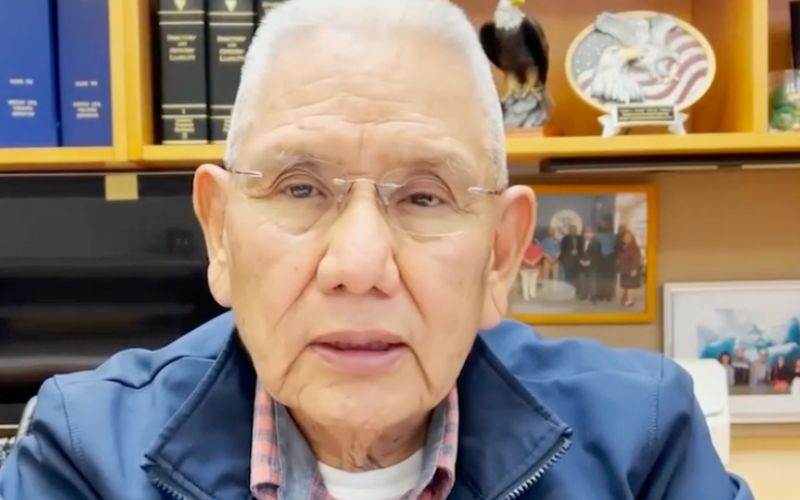
- Details
- By Native News Online Staff
The Jicarilla Apache Nation is mourning the passing of its leader, President Edward Velarde, who died on Sunday, May 12. He was surrounded by family and friends at the time of his death. Velarde, who served as president of the tribal nation since 2019, was 76.
“President Velarde was a beloved member of our community and a tireless advocate for the Jicarilla Apache people. His leadership, passion, and commitment to our Nation’s progress and well-being were evident in every aspect of his service. President Velarde’s contributions to the Jicarilla Apache Nation are numerous, and his legacy will continue to inspire future generations,” the Jicarilla Apache Nation said in a statement.
Born on July 4, 1947, to Leverita Velarde and Roger Negro, Velarde graduated from Dulce High School in 1966 and entered the US Air Force as an engine mechanic. He served in Vietnam, where he became a sergeant. He returned home and received a bachelor’s degree in business. During his career, he served as a housing director and maintenance director.
Velarde began his service for the Jicarilla Nation as a tribal councilor and later served as vice president of the tribe. In 2019, he became president. He was known for his genuine caring for everyone.
Vice President Sonja Newton will assume the responsibilities of the president per the tribal nation’s constitution.
“President Velarde was a true leader who always put the needs of our people first. His vision and dedication have set a strong foundation for our future. We will honor his memory of continuing to work towards the goals he set for our Nation,” Newton said.
Praise for Veldare’s life and dedicated service to the Jicarilla Apache Nation came from state and federal officials this week. New Mexico Governor Michelle Lujan Grisham expressed her condolences in a statement released on Monday:
“President Velarde was a committed, effective leader who always sought to strengthen state-tribal relations. One look no further than his leadership on energy and rural economic development to understand his commitment to his tribal community and the State of New Mexico. Manny and I extend our condolences to President Velarde’s family and the entire Jicarilla Apache Nation as we all grieve his loss.”
Grisham ordered all flags in the state to fly at half-staff through Thursday, May 16, in honor of Velarde.
“President Velarde demonstrated incredible leadership and dedication to his Nation. I am sending good thoughts to President Velarde’s family, friends, and the Jicarilla Apache Nation during this difficult time,” New Mexico Indian Affairs Department Cabinet Secretary Josett Monette said in a statement.
U.S. Senator Martin Heinrich (D-N.M.) issued the following statement for Velarde on Thursday:
“President Velarde was a dedicated leader guided by his passion for serving others and rooted in Apache tradition and culture. As President of the Jicarilla Apache Nation and as a veteran, he leaves behind a true legacy of service to his community and our nation. I was honored to work with him to deliver long-term water security for Jicarilla through the Navajo-Gallup Water Project, to pursue new opportunities in clean energy, and to improve the Tribe’s access to everything from health care and affordable and reliable internet to safe transportation and housing. My thoughts are with President Velarde’s family and the entire Jicarilla Apache Nation during this difficult time.”
Veldare is survived by his sons Doyle Velarde, Kaiba Velarde, Allen Otole; daughters Julianne Velarde, Janine Paiz, Cascindra Willie, Tami Herrera, Paige Velarde; brothers Jubal Sunrise & Adam Romero; grandchildren.
A funeral service was held at the Vietnam Memorial Gymnasium in Dulce, New Mexico, on Wednesday, May 15, 2024.
More Stories Like This
Native News Weekly (August 25, 2024): D.C. BriefsUS Presidents in Their Own Words Concerning American Indians
Flanagan Calls ICE Agents ‘out of control’ after Woman Killed in Minneapolis
American Indigenous Tourism Association Announces New Board Members
Deb Haaland Talks Youth, Jobs and Opportunity in Governor Bid
Help us defend tribal sovereignty.
At Native News Online, our mission is rooted in telling the stories that strengthen sovereignty and uplift Indigenous voices — not just at year’s end, but every single day.
Because of your generosity last year, we were able to keep our reporters on the ground in tribal communities, at national gatherings and in the halls of Congress — covering the issues that matter most to Indian Country: sovereignty, culture, education, health and economic opportunity.
That support sustained us through a tough year in 2025. Now, as we look to the year ahead, we need your help right now to ensure warrior journalism remains strong — reporting that defends tribal sovereignty, amplifies Native truth, and holds power accountable.
 The stakes couldn't be higher. Your support keeps Native voices heard, Native stories told and Native sovereignty defended.
The stakes couldn't be higher. Your support keeps Native voices heard, Native stories told and Native sovereignty defended.
Stand with Warrior Journalism today.
Levi Rickert (Potawatomi), Editor & Publisher


